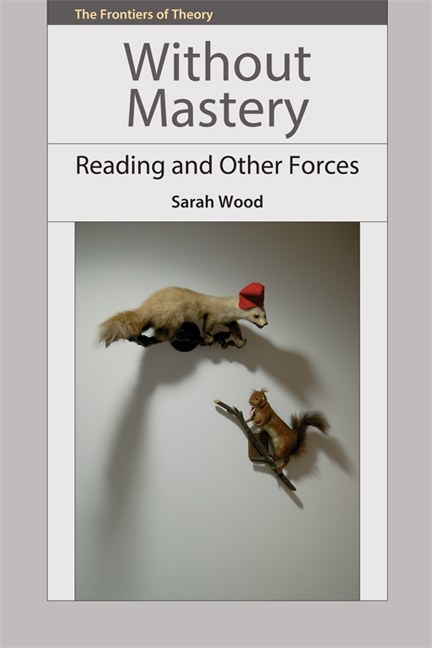Book contents
- Frontmatter
- Contents
- Series Editor's Preface
- Acknowledgements
- Epigraph
- Through the Reader
- Inventing the Reader
- Try Thinking As If Perhaps
- A Mere Instinctive Deconstruction
- Close to the Earth
- Beyond Me Nowhere But This Earth
- Edit
- Reading Matters
- Some Thing, Some One, Some Ghost (About the Fires of Writing)
- Nightshift
- Too Late To Begin?
- Notes
- Index
Reading Matters
Published online by Cambridge University Press: 05 August 2016
- Frontmatter
- Contents
- Series Editor's Preface
- Acknowledgements
- Epigraph
- Through the Reader
- Inventing the Reader
- Try Thinking As If Perhaps
- A Mere Instinctive Deconstruction
- Close to the Earth
- Beyond Me Nowhere But This Earth
- Edit
- Reading Matters
- Some Thing, Some One, Some Ghost (About the Fires of Writing)
- Nightshift
- Too Late To Begin?
- Notes
- Index
Summary
One will never be able to prove that it happened, only swear that it did.
(Derrida, Veils)‘One will never be able to prove that it happened, only swear that it did.’ Then it's as if this thing that has happened, had not yet happened. One awaits it, without being able to expect it. The things we would swear to, invite a subtler and more naive response than we are able to give to what is evident.
My table of contents, the table des matières that would have narrowed things down and allowed me to bring you quickly to the essential or central concerns of this chapter, would have discussed materiality in terms of 1) perceptual experience, 2) Derrida's notion of quasi-transcendental paper, 3) letters, and 4) tables. I also wanted to say something about reading and sexual difference, and to address their relation to the institutionalisation of deconstruction in the UK and the US. This last was something I could neither abandon nor pursue. What follows remains, determinedly, in the realm of insistence and bearing witness. It moves between English and French and sometimes German with especial awkwardness and care, to think about mylanguage and theirlanguages, and as always to try to take into account what does not come down to language at all but marks language and asks to be read: what matters. Letters, and beyond them, the reading that barely knows how to read.
We are here together, and I am covered in ink, thinking; just don't ask me to prove it, or if you want a proof remember that you ask for proofs just when you realise that you don't see what you see, you can't hear what you hear: perception isn't happening. You're overlooking something or perhaps it's coming at you double. Sometimes, in the absence of proof, a voice comes to you saying, smiling: ‘You're deaf and blind – this must be a text. Come with me now, to writing.’
And then something happens to belief. It loosens. The more relaxed it is, the further you can go. As if that smiling voice took you back to the early times of yourself when the distinction between subjective and objective is not yet instituted.
- Type
- Chapter
- Information
- Without MasteryReading and Other Forces, pp. 85 - 101Publisher: Edinburgh University PressPrint publication year: 2014



